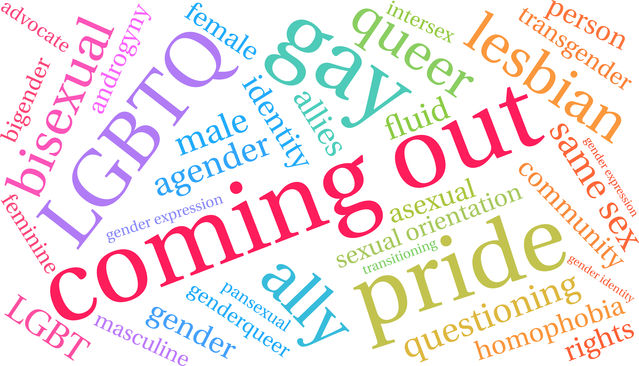Sexual Orientation
When Your Child Opens the Closet Door
7 ways to deal with your feelings and show your love
Posted July 26, 2019

It may be a conversation you never imagined you would have or one you’ve long expected: your adolescent or adult child has just told you that he or she or they happen to be gay, lesbian, transgender, or non-binary.
Whether or not you’ve been blindsided with the news, you may be momentarily overwhelmed with a variety of feelings. You may feel happy to discuss gender and sexuality openly with your child. You may feel a flash of anger or guilt or shame, wondering why, blaming or feeling blamed, agonizing (at least momentarily) over what the rest of the family, your friends and neighbors will think. You may feel a surge of love and of fear, imagining your beloved child being marginalized, hurt or worse. You may feel disappointment that your child may be living a different life than the one you had dreamed for him or her. Or you may feel confused. It's a lot to take in. But what you say and do at this moment when your child comes out to you can have a lasting impact on your relationship.
Judy’s initial conversation with her adult son was a confrontation–and it did not go well. She had traveled to Los Angeles from Indianapolis to help her son Evan, a medical resident, unpack and settle into his new apartment. While he was at work, she unpacked a box of financial records and a small envelope with photos fell out of one of the files. The pictures–naked and explicit–were of her son with another man he had insisted was simply a friend. Judy confronted her son the minute he walked in the door from work, screaming that she was horrified and ashamed that he was a homosexual and that she wished he were dead. Then she called a cab to take her to the airport. Their total estrangement was brief, but the angry and ugly words couldn’t be unsaid or unheard. Although, in time, Judy accepted the reality of Evan’s sexual orientation and grew to love his eventual life partner, the memory of that confrontation lingered between them for some time.
Dale, on the other hand, wasn’t surprised when his fourteen-year-old son told him that he was gay. Nevertheless, he had mixed emotions initially. “My first reaction was fear,” Dale remembers. “I thought to myself ‘Please don’t let him be hurt! Please, no one hurt him!’ Then I took a deep breath and looked at this marvelous son I love so much and my next thought was ‘I hope he finds someone wonderful to love!’ And, now that he is an adult, he has found and married someone as wonderful as I had hoped. I’m so thankful and proud of the man he has grown to be.”
Each family's coming out scenario is, in many ways, unique. But if you have an LGBTQ child, you’re far from alone. An estimated 9 million Americans, representing 3.5 percent of adults in the U.S., a figure roughly equivalent to the population of New Jersey, identify as gay, lesbian, bisexual or transgender. So that’s a lot of parents who have had a beloved child come out. And some have yet to hear the news.
A Pew Research Center survey of LGBTQ American adults found that 56 percent of those polled had told their mothers while only 39 percent had told their fathers. Those who had told their parents reported that the conversation had been difficult, but relatively few said that their coming out had resulted in long-term damage to their relationship with their parents.
So what can you say or do to keep your relationship loving after your child opens the closet door and comes out to you?
Take the news seriously and accept the fact that change is off the table. It can be tempting to dismiss disquieting news or to forget that, while this may be news to you, your child has lived with this knowledge for some time. Comments like “It’s just a phase. You’ll grow out of it!” or “Don’t be silly. Girls adore you!” can sabotage true communication and sharing. Those who took part in the Pew study reported that they had spent a lot of time living with their feelings and emerging identity before sharing this information with parents. The study found that twelve was the median age when gay, lesbian or bisexual adults had the first inkling of their orientation. By a median age of seventeen, they knew for sure what their sexual orientation was. Nevertheless, the median age for sharing this information with family members or close friends was twenty. So it’s quite likely that by the time parents hear the news, the child’s sexual orientation or gender identification is not just a passing phase, but a well-established aspect of their identity.
Ask for time to take the news in before you express anything but love. If you find yourself grief-stricken and shocked, try to express love for your adult child while asking for time to pull your thoughts together. It’s better to ask for time than to blurt out comments or questions that are hurtful.
Suspend judgment. This isn’t the time to remind your child about how you were raised or your religious convictions. That's old information. Stay in the present and work on coming to terms with today's realities. Instead of imagining dark scenarios of a loveless, lonely future for your child, consider the new possibilities. Times have changed significantly, with many in the LGBTQ community marrying and having families. Many religious leaders are taking a kinder, more inclusive look at this community, with Pope Francis commenting “Who am I to judge?” not long ago. In the not-so-good old days of our youth, many brilliant and talented people – such as the late Alan Turing who contributed so much to Allied success in World War II with his code-breaking computations – were subsequently tormented for their sexual orientation and lost to us far too soon. And so have too many cherished sons and daughters been lost to us through prejudice and hatred. Your child needs to feel that, with you, he, she or they, will always be safe and loved – whether or not you fully agree with each other.
Show a willingness to listen and to learn. Don’t close yourself off to new information. Show loving curiosity. Let your child educate you – particularly if they happen to be transgender or non-binary. The concept of gender fluidity is relatively new in public awareness and is a mystery to many confused parents and family members. When you are willing to listen and to learn, it’s easier to build a new understanding between you and your child and to keep the loving connection you’ve always had.
Realize that this is the same child you’ve long cherished. Your child’s wonderful qualities that have delighted you over the years have not changed. Now you just know one more aspect of the person he, she or they have grown to be. The adult child you’ve loved so much is still there–unless you allow your differences to come between you.
Seek special help to resolve your feelings. Seek therapy for yourself and/or check with your local chapter of Parents and Friends of Lesbians and Gays–PFLAG–via their website: www.pflag.org.
Express your love and support, even when your feelings and beliefs are in conflict. Meeting your child’s coming out with anger, judgment and rejection can trigger estrangement or, at the very least, pain that lingers between you for some time. Let your parental love supersede your discomfort. Ask your child what more you can do to help him feel safe, emotionally supported and loved. It’s crucial, when your child is so vulnerable, to express unconditional love and caring despite any differences you may have. Your loving embrace can be, quite literally, life-saving.
References
Gary J. Gates, "How Many People Are Lesbian, Gay, Bisexual and Transgender?", Williams Institute on Sexual Orientation and Gender Identity Law, UCLA School of Law (2011).
George Gao, "Most Americans Now Say Learning Their Child is Gay Wouldn't Upset Them", Pew Research Center, June 29, 2015.




